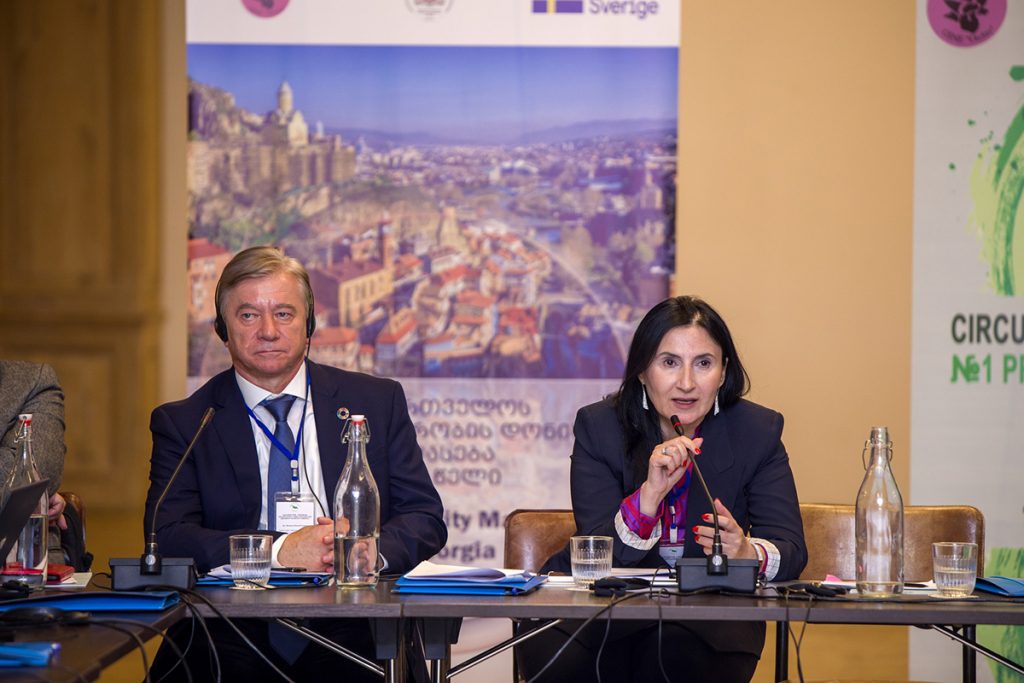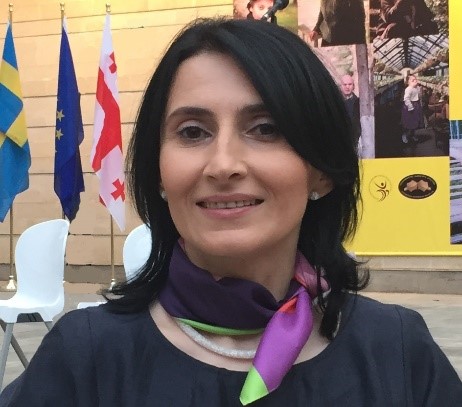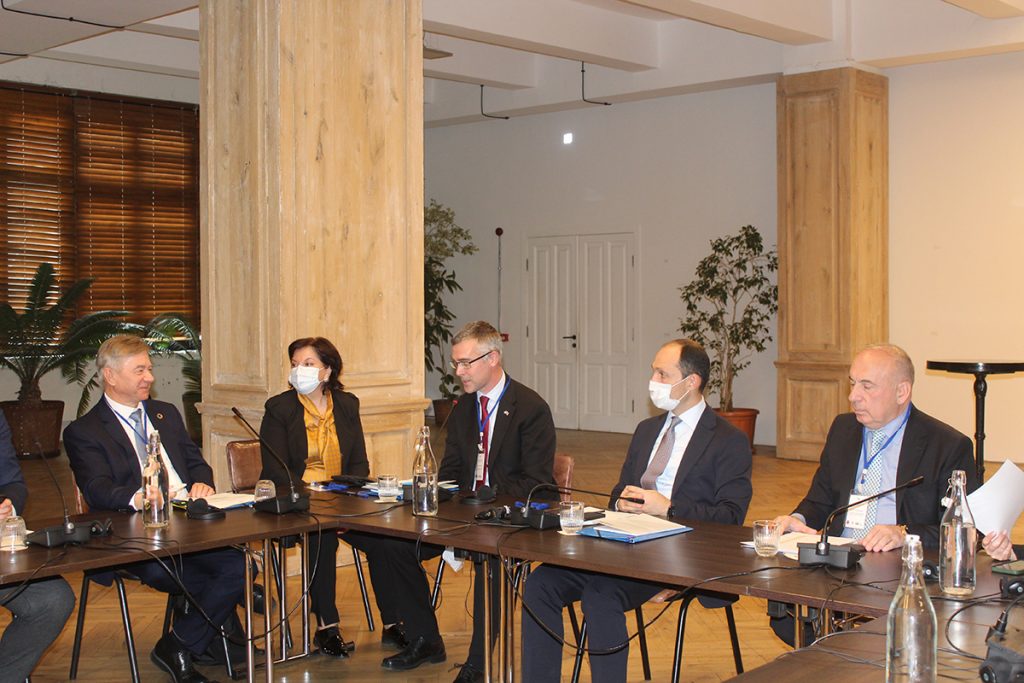Green Transformation of Orchis

The Georgian Society of Nature Explorers Orchis aims to actively contribute to the accelerated transition to a green economy, which implies promoting environmental, social and corporate governance, green financing, green procurement practices and their implementation in Georgia, while taking into account best international practices.
The projects of Orchis, carried out with the support from the government of Sweden and in partnership with the government of Georgia, focus on environmental protection and the transition to the circular economy. Orchis believes that civil society, which closely cooperates with the government, the business sector, financial institutions, academia and other relevant stakeholders can play a significant role in the green transformation process and the implementation of the principles of circular economy at various levels of economic activity.
The projects of Orchis are the basis for the accelerated implementation of the circular economy. They are also important for meeting the commitments under the Association Agreement with the EU and engagement in the process of the European Green Deal, which, in its part, will ensure meeting Sustainability Agenda.
Mariam Kimeridze, Chair of GSNE Orchis, Doctor in Biological Sciences, Expert in Environmental, Social, Governance and Sustainability Areas speaks about the ongoing projects of Orchis and the global goals.

Mariam Kimeridze, Chair of GSNE Orchis, Doctor in Biological Sciences, Expert in Environmental, Social, Governance and Sustainability Areas speaks about the ongoing projects of Orchis and the global goals.
GSNE Orchis has been implementing projects that are targeted at environmental protection and the transition to the circular economy. Tell us about the projects funded by the government of the Sweden, what kind of cooperation do you have in this direction?
Since 2019 GSNE Orchis has been implementing the circular economy programme with the financial support of the governments of Sweden and Georgia. This programme is aimed at raising the awareness of Georgian society about the Circular Economy (CE) and its benefits in order to accelerate transition to circularity and facilitate the green economy development. In addition, it envisages the mapping of circularity level of Georgian economy and preparation of recommendations for the National CE Strategy and Roadmap for Georgia to promote policy change.
GSNE Orchis has considerable experience in waste minimization projects that are an essential part of greening the economy with the support of the government of Sweden. GSNE Orchis has been working in this area since 2010, during which the organization implemented several projects in waste management and environment pollution that aimed at awareness raising and capacity building programmes to facilitate the systemic change through a wider policy and advocacy work. The awareness raising and capacity building programmes were designed based on the need analysis, targeting regional and municipality level authorities, business sector, community, academia and young generation. Awareness raising and capacity building activities have particularly accentuated waste prevention and 5R approaches as the most efficient instruments of the waste management, pollution prevention and greener economy. The experience of EU countries and respective case studies have been used to demonstrate results that could be achieved using such approaches.
The key elements of the projects implemented by the GSNE Orchis and supported by the government of Sweden include the following:
Awareness Raising Programme on Circular Economy
- The programme provides basic information on circular economy, circular business models and financing opportunities as well as recommendations to various groups of stakeholders, including policy makers, financial institutions and project promoters how to accelerate the implementation of circular economy principles at various levels of economic activity.
- The programme was initiated in November 2019 with the recruitment of an international expert in circular economy. To date there have been eight one day conferences targeting the following groups: (i) policy makers; (ii) project promoters and regions/municipalities; and (iii) business community; (iv) financial institutions; (v) academia; (vi) universities and (vii) SMEs. There was also a dedicated conference for the Parliament of Georgia.
- All conferences have been well attended by parliamentarians, top level government officials both at central and local levels and key business leaders. At the conferences the key topics covered included general information on the road to the circular economy, the legacy of the industrial era, current trends – problems vs opportunities, comparison of linear vs circular approaches, circular economy business models as well as information regarding EU Circular Economy Policy including the original Circular Economy Package of 2015 and a new Circular Economy Action Plan adopted in 2020.
- Two books on the circular economy were published: (i) For Project Promoters and Policy Makers and (ii) For the Universities.
- Several topical articles were published in Georgia Today and in Forbes Georgia.
- Several TV broadcasts and radio interviews were organised to disseminate information on the circular economy.
Circularity Mapping and Development of Recommendations for the Circular Economy Strategy
As the programme on raising awareness on the circular economy in Georgia has been received very positively by a number of stakeholders, the government of Georgia has approached SIDA to support them in mapping the circularity of the Georgian economy with a view to provide recommendations to develop a Road Map to Circularity and adopt a Circular Economy Strategy. The request has been approved by the government of Sweden and the programme coordinated by the GSNE Orchis has just been completed.
The key objectives of the programme included the following:
- Circular economy in Georgia is mapped in close cooperation with the GoG
- Appropriate national quantitative circular economy policy targets and circular ambitions are identified and established in close cooperation with the GoG
- Sectoral circular economy opportunities are identified
- Priority sectors for circular economy initiatives and sector-specific policy options are determined in close cooperation with the GoG
- Recommendations for the Circular Economy Roadmap and Strategy of Georgia are developed.
The implementation of the programme has been led by an International Expert in the Circular Economy (Team Leader) supported by a National Expert in Sustainable Development (Deputy Team Leader) and a group of local Georgian experts with a sound knowledge of the Georgian economy and environmental, social and governance issues. In addition, the government of Georgia has formed an inter-ministerial working group (coordination board) which included members from different governmental departments (including business/industry and environment), to ensure smooth implementation of the Circular Economy Programme in Georgia, broad expertise as well as early buy-in from these key departments. The programme resulted in the preparation of the Georgia Circularity Mapping Report. A set of recommendations on appropriate national quantitative circular economy policy targets and circular ambitions were provided, sectoral opportunities were identified, sector-specific policy options were defined and recommendations for the Circular Economy Road Map and Strategy for Georgia were developed.
Development of a Pipeline of Projects
The GoG firmly believes that the introduction of a new national strategy for the circular economy should be supported by practical measures. Therefore, following the recommendations of the inter-ministerial CE working group (coordination board), the GoG requested SIDA to support the preparation of investment projects targeting circularity measures primarily, but not exclusively to support the implementation of the Extended Producers Responsibility (EPR). As a result, a pipeline of 14 investment projects, mostly targeting SMEs, has been prepared by CSO Georgian Society of Nature Explorers Orchis. Those which are at an advanced stage of development are currently at the stage of seeking financial support from various financial institutions.
In the framework of the Keep Georgia Tidy project which envisages environmental protection, GSNE Orchis and your partner organizations have been carrying our various activities. Could you please tell us about this project? How does this project contribute to the accomplishment of the Sustainability Agenda?
The Keep Georgia Tidy project implemented by the GSNE Orchis with partner organizations and supported by the Government of Sweden is aiming to attain environmentally conscious generation in Georgia and to reduce pollution from municipal waste and greenhouse gas emissions in Georgia.
Project activities include the following:
- Environmental awareness raising and capacity development workshops for the students of universities of Georgia on circular economy, climate change, biodiversity, waste management, environmental pollution, gender and poverty reduction and establishment eco-committees in selected universities and promotional campaigns through social and mass media.
- Awareness raising and capacity development in 13 municipalities of Georgia and preparation of waste management plans and respective legal requirements.
- Development of Regional Waste Management Plan for Kakheti Region in a participatory manner, in line with Waste Management and Regional Development Strategies.
- Climate change adaptation measures implementation through Bio-restoration activities including planting of native tree and shrub species for 16 ha of cleaned up areas and trainings of young generation and key stakeholders on positive input of bio-restoration and afforestation activities.
- Remediation of polluted territories in 10 regions of Georgia and awareness raising and capacity development of the municipal authorities and other stakeholders on soil remediation methods, etc.
The Keep Georgia Tidy Project activities contributes to the delivery of all 17 SDGs which would also contribute to meeting Georgia’s international commitments on Sustainability Agenda.

In October GSNE Orchis organized the National Meeting for Mapping Circularity in Georgia with the funding of the government of Sweden. To discuss the importance of the circular economy and its perspectives in Georgia, how should the transition to the circular economy happen?
Circularity mapping is a complex process. To perform it, the task team has conducted an assessment of economic sectors of Georgia in terms of circularity. At the initial stage a screening exercise was conducted to select out of the 90 sectors (economic activities) listed in the register of National Office of Statistics those sectors which may be prospective for the transition to circular models of economy. Two simple criteria have been used for screening: economic criteria characterizing the role of the sector in the country’s economy (input in GDP; annual production; number of employees); and volumes of waste generated or losses. As a result of the screening, 14 sectors have been identified as having potential (medium; high; extremely high) for developing circularity. Subsequently, the task team took a deep dive in the 14 selected sectors and prepared a snap-shot description of each, including mass flows of materials (raw materials, products, by-products and wastes), losses and wastes generated, share of recycled wastes and estimation of potential for recycling.
The mapping process took two years of intensive work by 13 experts representing the highest level at various economic sectors. The experts interacted closely with the Inter-Ministerial Co-ordination Board consisting of 36 experts from various ministries and governmental agencies under the leadership of Acad. Solomon Pavliashvili, Deputy Minister at the Ministry of Environmental Protection and Agriculture of Georgia. In addition, experts carried out extensive consultations and interviews with business leaders and reviewed 82 of the most relevant and most recent reference documents.
The team of experts also prioritised and clustered industries according to their circularity potential. This entailed splitting the entire set of economic industries represented in the country into groups of the same type according to the criteria of circularity (economic and environmental indicators, resource consumption, material and waste flows), indicators characterizing key players and the process of sector administration. The main conclusion was that all of the preselected 14 sectors have tangible potential for shifting towards the circular models of economy, some of them as high as 25 per cent and that not one of these sectors should be discarded during the development of the CE transition strategy and action plans. Agriculture seems to be the highest priority sector for Georgia, as six sectors out of the preselected 14 represent subsectors of Agriculture.
The next steps will be for the government of Georgia to analyse the recommendations and initiate the preparation of the Circularity Roadmap and the National Strategy for Circular Economy.
What would you recommend to the public and private sectors regarding the climate change and circular economy to ensure achievement of the SDGs?
Climate change and environmental degradation are an existential threat to Georgia, the Caucasus region, Europe and the world. To overcome these challenges, Georgia as well as other countries of the region need to transform to achieve modern, resource-efficient and competitive economies. Fighting climate change and achieving the transition to a climate-neutral society will require significant investments, research and innovation, new ways of producing and consuming, and changes in the way we work, use transport and live together. Making Georgia’s economy sustainable by turning climate and environmental challenges into opportunities across all policy areas and making the transition just and inclusive for all will require a concerted action of many stakeholders. Georgia has already embarked on the road of greening its economy in line with the principles of the European Green Deal but will require further steps to achieve an accelerated progress in these areas.
Renewable energy solutions fail to address the chunk of emissions. 70% stem from resource use and handling. We need the clean energy transition to happen, but it cannot keep us on the well below 1.5-degrees trajectory alone. Nor does it tackle our rising consumption levels and concerning resource scarcity. If the world moved away from a linear economy and toward a circular one, the analysis shows that global greenhouse gas (GHG) emissions would drop by 39% and virgin resource use by 28%, and we would reach the goals of the Paris Agreement. The Circular Economy Contributes to the delivery of at least 12 SDGs which would also contribute to meeting Georgia’s international commitments to implement the SDGs.
What is the role of the multi-sectoral partnership between the public, private and non-governmental sectors in achieving the SGDs by 2030? What is the role of the private sector and their corporate responsibility in this context?
Civil society working closely with the government and other relevant stakeholders can play a significant role in the green transformation process which echoes EU-Georgia Association Agenda for 2021-2027. No government is capable of carrying out the transition on its own. Georgia should benefit from the experiences of more advanced economies in the implementation of the circularity principles to achieve the SGDs commitments and learn from their successes and mistakes. This calls for forming strong partnerships in order to choose the most optimal path to the transition to the circular economy. A good example of such a partnership is the programme supported by the Government of Sweden aiming at promoting the circular economy. The ongoing programme implemented by CSO Georgian Society of Nature Explorers Orchis within the framework of Keep Georgia Tidy Project has already raised much needed awareness about the circular economy and provided recommendations to various groups of stakeholders, including policy makers, financial institutions and project promoters how to accelerate the implementation of circular economy principles at various levels of economic activity. This programme is the basis for the accelerated shift to circularity. It is also a vital contribution to fulfil Georgian commitments under the Association Agreement with the European Union. There was also an overwhelming response from the industry, particularly from the SMEs who see a lot of opportunities in the “green future”. However, this shift requires actions at many levels and, therefore, there is a need for stronger partnerships and cooperation to launch a set of actions designed to provide impetus for an accelerated transition to the circular economy. These partnerships would assist Georgia in defining specific objectives based on an analysis of the existing needs, experiences and opportunities.




 Search
Search





